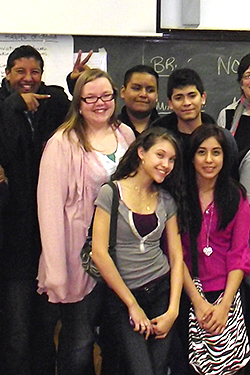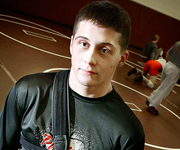Classroom Constants
by Kristin Trease ’12
 Growing up in my Nebraska town of 400, it was easy for me to identify my constants—the people or things in my life that were always there. For 13 years, the biggest constant outside of my family was school. I walked the same halls when I was a stir-crazy senior as I did when I was a frightened kindergartener.
Growing up in my Nebraska town of 400, it was easy for me to identify my constants—the people or things in my life that were always there. For 13 years, the biggest constant outside of my family was school. I walked the same halls when I was a stir-crazy senior as I did when I was a frightened kindergartener.
When I moved to Northwestern, my constants became my professors and the English and theatre departments, where I easily found a home.
That’s one of the main reasons I became a teacher—because I always felt safe at school.
I decided during my junior year at Northwestern that I wanted to student teach away from small towns. So with little hesitation, I applied to the Chicago Semester program. It was only after I was accepted that I hesitated—as the people I told responded with shock and concern.
When I walked into Kelvyn Park High School the first week of September, I had no idea what to expect. It was unlike any other first day of school I’d ever experienced. Truth is, school didn’t feel so safe anymore.
The Chicago Teacher’s Union strike and new decision-making entities in the school did little to alleviate the uneasy feelings teachers and students alike encountered the first couple months of school. We were out of the classroom the second week of school because of the strike. Student schedules were a mess until the ninth week. Teachers were growing frustrated at the lack of supplies and support.
And here I was, assigned to teach at a high school with a student body the same size as my college campus. It was intimidating. It was scary. It was the best four months of my life so far.
Kelvyn Park (KP) is located in the Hermosa neighborhood of Chicago, which has the highest number of different gang factions in the city. There is a strong Hispanic influence; approximately 90 percent of KP’s student body is Hispanic. Almost 93 percent of the students come from low-income homes. The school hasn’t had any renovations in probably 20 years. There aren’t enough teachers, art programs, sport programs, or funds to support the school’s needs.
Every day about 120 freshmen passed through my classroom. We fell into our grooves, laughing a lot and loudly, exchanging sarcasm, and distracting each other with tall tales. Slowly, true stories of home and school began slipping in.
When the students were frustrated, they told me. When class schedules changed, they sought my advice. When word of a fight floated around, I was warned.
Without really realizing it, I was becoming a constant for them. I was surprised. Joyful. Humbled.
Even more surprising was my own realization concerning my new constant.
Student teaching was stressful; I was up way too late grading and planning lessons. Even though my cooperating teacher took good care of me, I knew there were serious issues happening in the school. I was overwhelmed much of the time.
Through it all, there was one thing I could count on every day: my students. As I became their constant, they became mine.
Nothing about them was actually very constant. On any given day, I had a whole range: punctual and present or tardy and absent; excited to learn or hating everything planned; willing to share every detail or completely shut off. But they were there, just like me.
Many beginning teachers have this idea that they will change the lives of their students by getting them excited about learning. (And maybe someday someone will make an inspirational movie based on their classroom.) For me, this dream lasted about two minutes into the first day of school.
But I realized that’s OK. Instead, just being present and listening with my whole heart became a daily goal—and daily struggle—while student teaching. I hope the freshmen at Kelvyn Park felt I was there for them.
I know they were always there for me. Those ridiculously crazy, wonderfully creative, and incredibly strong freshmen changed my life.
After student teaching in the Chicago public school system, English major Kristin Trease graduated in December and has been substitute teaching near her hometown of Orchard, Neb. Next fall she and several Northwestern friends are moving to Seattle, where she plans to teach high school English.
 In classrooms, school offices, research centers and government, Northwestern alumni are working to improve education in America.
In classrooms, school offices, research centers and government, Northwestern alumni are working to improve education in America. No longer taboo, tattoos mark what’s important to
students, including their faith.
No longer taboo, tattoos mark what’s important to
students, including their faith. Double-leg amputee Preston Hoebelheinrich thanks
God every time he steps onto the wrestling mat.
Double-leg amputee Preston Hoebelheinrich thanks
God every time he steps onto the wrestling mat.
Classic Comments
All comments are moderated and need approval from the moderator before they are posted. Comments that include profanity, or personal attacks, or antisocial behavior such as "spamming" or other inappropriate comments or material will be removed from the site. We will take steps to block users who violate any of our terms of use. You are fully responsible for the content that you post. Comments posted do not reflect the views or values of Northwestern College.